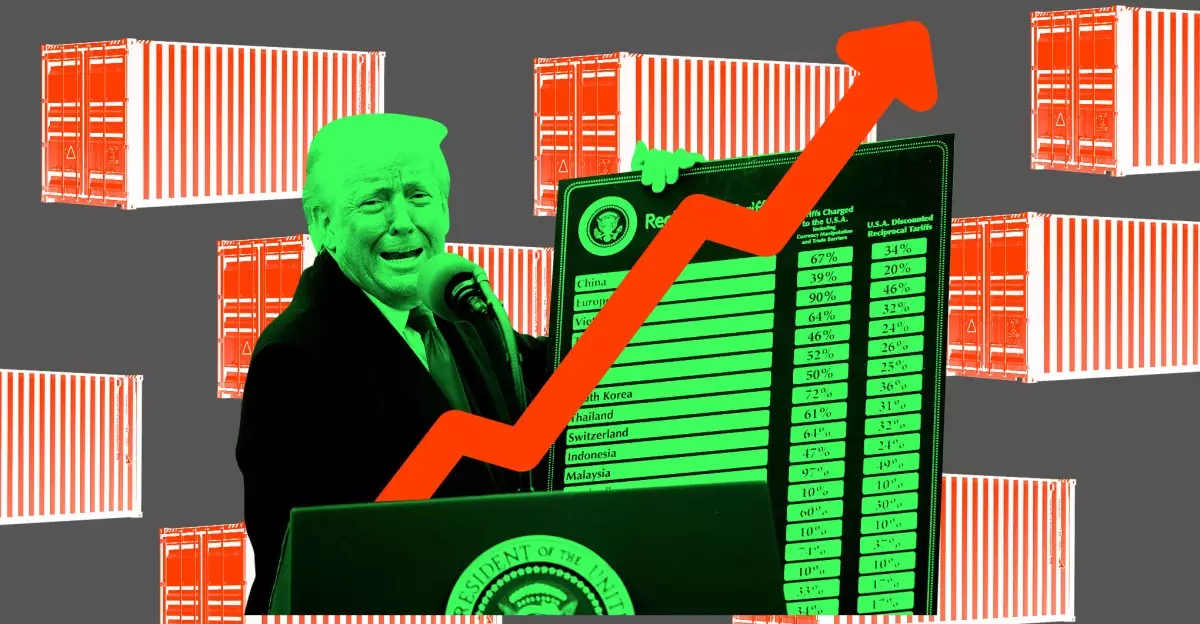In recent times, the landscape for major technology companies in the United States has rapidly transformed. Initially, there was hope among leaders in the tech sector that they would find an ally in the Trump administration, seemingly poised to defend their interests against regulatory pressures, particularly from international quarters. However, as the political climate has soured, it has become evident that these businesses are not shielded from the repercussions of an escalating trade war. Instead of the protective umbrella they anticipated, tech giants like Meta, Apple, and Tesla are finding themselves entangled in complex geopolitical struggles that could profoundly impact their operations and market standings.
Among the key players affected, Meta and Apple are now staring down the barrel of punitive actions from the European Union, which is set to administer fines for alleged violations of the Digital Markets Act. This unexpected fallout stands in stark contrast to what tech executives hoped for when they voiced support for the current administration. The EU’s proposed levy on advertising revenues signals a significant departure from expected norms, creating an uncertain environment for tech leaders who had calculated their political bets on regulatory leniency.
Elon Musk: The Double-Edged Sword of Popularity
Elon Musk’s situation presents another dimension of this unfolding saga. While his ties to former President Trump garnered initial public enthusiasm, those same connections now seem to backfire. A recent analysis revealed a decline in support for Musk in the U.S., coinciding with his increasing association with the ex-president. This political entanglement isn’t just a matter of reputation; it has tangible implications for Tesla’s performance. The company’s stock has plummeted, losing over a third of its value this year, compounded by tariffs that have stripped it of the option to sell new U.S.-made vehicles in China.
This juxtaposition of admiration and repulsion reflects a larger truth about influencers in the tech industry: their fates can swiftly shift based on the political tides. The current precariousness surrounding Musk is emblematic of a broader dilemma that tech executives face as they navigate the murky waters of global competition and national policy.
The TikTok Quandary: A Clash of Cultures
Compounding the challenges for tech companies is the imbroglio surrounding TikTok, which finds itself at significant risk due to Trump’s aggressive tariffs targeting China. As one of the most downloaded apps in the U.S., TikTok’s dominance has attracted the scrutiny of policymakers who question the security of user data and its Chinese ownership. Despite TikTok’s attempts to secure its future through various deal negotiations, the landscape remains fraught with obstacle after obstacle. The Chinese government’s resistance to perceived exploitation has left potential buyers and investors in limbo.
Given the tense dissonance between U.S. interests and Chinese policy, TikTok’s leaders are walking a tightrope. AppLovin’s CEO candidly expressed frustration over the situation, acknowledging the challenge posed by tariffs in promoting open negotiations. Such complexities underscore a growing trend whereby prominent technology companies are leveraged as bargaining chips on the global political chessboard.
OpenAI: Emerging Controversies and Existential Questions
The situation isn’t confined solely to social media giants and automakers. OpenAI has made headlines this week due to a counter-suit against Elon Musk, raising significant questions about the trajectory of its development. The discussions surrounding OpenAI’s transition from a non-profit model reveal an uncomfortable truth: the balance of ethical governance and commercial success is fragile. Critics argue that the company, initially positioned as a bastion of responsible AI, may be straying from its foundational principles as it entrenches itself within a wealth-driven framework.
With an increasing number of stakeholders questioning OpenAI’s motivations, the internal dialogue is likely to become ever more contentious. The departure from a charitable model may indeed unlock vast potential for profit, yet it simultaneously risks diluting the mission that originally garnered public support—fostering innovation while maintaining ethical integrity.
Google’s Workforce Dynamics: Layoffs and the New Normal
While self-inflicted wounds and political pressures take center stage, the tech workforce is experiencing dramatic changes as well. Google has announced layoffs in its Platform and Devices division, catching many employees off guard with the terms of these cuts. The nuances of labor dynamics in the tech industry tell another story of a sector grappling with rapid growth and the subsequent contraction. The shift in Google’s workforce practices signals a potential recalibration of expectations for employees in an industry that has long been considered synonymous with job security and growth.
Furthermore, the juxtaposition of severance deals for those departing versus those opting for voluntary layoffs points to a disquieting inconsistency within corporate practices, hinting at the broader implications of financial austerity in the wake of economic uncertainty.
The American tech industry now finds itself at a pivotal crossroads, teetering between opportunity and jeopardy. As global forces continue to clash and reshape the competitive landscape, the ability for these tech titans to adapt and respond to multifaceted challenges will define their fates in the years to come.

